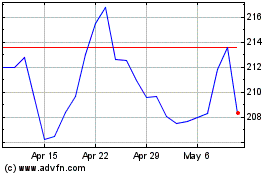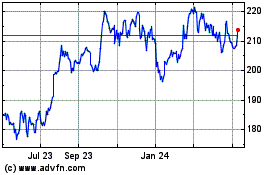Oil Prices Rally, Erasing Earlier Losses
November 16 2015 - 4:21PM
Dow Jones News
By Nicole Friedman
U.S. oil prices rose Monday, erasing earlier losses, after
nearing the psychologically key $40-a-barrel level.
The U.S. benchmark had fallen as low as $40.06 a barrel on the
New York Mercantile Exchange in intraday trading before rebounding.
Prices settled up $1, or 2.5%, to $41.74 a barrel.
Analysts cautioned that the rally could be short-lived and
attributed the price gains to traders who had bet on lower prices
closing out those positions. France escalated its air campaign
against Islamic State following the Paris terror attacks,
increasing market jitters about the Middle East, the world's most
prolific oil-producing region.
Both benchmarks slid to three-month lows Friday on concerns
about large global inventories. U.S. prices last fell below $40 a
barrel in August amid broad concerns about the pace of Chinese
economic growth. Before that, the $40 level was last broached in
2009.
"As we approach these six-year lows, you'll see more...bottom
pickers coming out," said Gene McGillian, senior analyst at
Tradition Energy. With prices near $40, he said, "we're going to
find out whether there is enough conviction on the part of sellers"
to bet that the market can go even lower.
Brent, the global benchmark, settled up 9 cents, or 0.2%, at
$44.56 a barrel on ICE Futures Europe.
Gasoline futures fell 0.03 cent to $1.2386 a gallon, the lowest
settlement since February 2009. Motor club AAA said Monday that it
expects U.S. drivers to see average retail gasoline prices below $2
a gallon by Christmas, down from $2.16 a gallon currently.
Oil prices wavered throughout the session as traders weighed the
persistent global glut of crude against concerns about violence in
the Middle East.
Though the Paris attacks fueled worries that unrest in the
Middle East could interrupt oil production in the region, they also
raised concerns about weaker fuel demand in Europe due to reduced
tourism.
Ample production of crude oil around the world and a huge
overhang of supplies limited price gains. The International Energy
Agency said Friday that commercial stockpiles of crude oil and
refined products held by developed nations reached nearly three
billion barrels at the end of September, a record high and enough
to meet global demand for about 64 days.
Governments of developed nations including the U.S. hold an
additional 34 days' worth of supply, the IEA said.
"The IEA reporting [developed nations'] inventories being at a
record-high level certainly should get people's attention," said
Dominick Chirichella, analyst at the Energy Management Institute.
"I think there's more to go to the downside."
Data provider Genscape Inc. said Monday that crude-oil supplies
in the storage hub of Cushing, Okla., rose by more than a million
barrels in the week ended Friday, according to a broker who had
viewed the data.
The average price of crude sold by members of the Organization
of the Petroleum Exporting Countries fell to $39.21 a barrel on
Friday, below $40 a barrel for the first time since 2009, the
organization said Monday.
Diesel futures rose 0.38 cent, or 0.3%, to $1.3851 a gallon.
Summer Said contributed to this article.
Write to Nicole Friedman at nicole.friedman@wsj.com
Subscribe to WSJ: http://online.wsj.com?mod=djnwires
(END) Dow Jones Newswires
November 16, 2015 16:06 ET (21:06 GMT)
Copyright (c) 2015 Dow Jones & Company, Inc.
CME (NASDAQ:CME)
Historical Stock Chart
From Mar 2024 to Apr 2024

CME (NASDAQ:CME)
Historical Stock Chart
From Apr 2023 to Apr 2024
